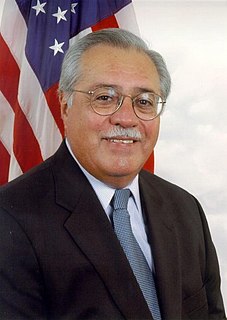A Quote by Rick Santorum
I want to make sure that the American worker has an opportunity to see their wages rise and their incomes increase.
Related Quotes
I think that one of the things that we all agree to is that the touchstone for economic policy is, does it allow the average American to find good employment and see their incomes rise; that we can't just look at things in the aggregate, we do want to grow the pie, but we want to make sure that prosperity is spread across the spectrum of regions and occupations and genders and races; and that economic policy should focus on growing the pie, but it also has to make sure that everybody has got opportunity in that system.
Sharp increases in the minimum wage rate are also inflationary. Frequently workers paid more than the minimum gauge their wages relative to it. This is especially true of those workers who are paid by the hour. An increase in the minimum therefore increases their demands for higher wages in order to maintain their place in the structure of wages. And when the increase is as sharp as it is in H.R. 7935, the result is sure to be a fresh surge of inflation.
If you're a poor worker - this is for new workers coming into the workplace - your benefits will increase at the current rate of increase. If you're a wealthier worker, your benefits would increase at the rate of inflation. And those changes would affect positively the unfunded liabilities inherent in Social Security.
Inflation is not a Robin Hood, taking from the rich to give to the poor. Rather, it deals most cruelly with those who can least protect themselves. It strikes hardest those millions of our citizens whose incomes do not quickly rise with the cost of living. When prices soar, the pensioner and the widow see their security undermined, the man of thrift sees his savings melt away; the white collar worker, the minister, and the teacher see their standards of living dragged down.
Our mission has been the protection of the wage-worker, now; to increase his wages; to cut hours off the long workday, which was killing him; to improve the safety and the sanitary conditions of the workshop; to free him from the tyrannies, petty or otherwise, which served to make his existence a slavery.
Democrats in Washington predicted that tax cuts would not create jobs, would not increase wages, and would cause the federal deficit to explode. Well, the facts are in. The tax cuts have led to a strong economy. Real wages were on the rise, and deficit has been cut in half three years ahead of schedule.
Nothing would more quickly and definitively reduce U.S. income inequality than allowing every worker in all businesses to participate in deciding the range of incomes from one worker to another. They would never do what is now a matter of normality: give one person millions, in some cases billions, while others have barely enough to make a living.
It is not the actual greatness of national wealth, but its continual increase, which occasions a rise in the wages of labour. It is not, accordingly, in the richest countries, but in the most thriving, or in those which are growing rich the fastest, that the wages of labour are highest. England is certainly, in the present times, a much richer country than any part of North America. The wages of labour, however, are much higher in North America than in any part of England.
The American people want to make sure that the rules of the game are fair. And what that means is that if you look at surveys around Americans' attitudes on trade, the majority of the American people still support trade. But they're concerned about whether or not trade is fair, and whether we get the same access to other countries' markets that they have with us. Is there just a race to the bottom when it comes to wages, and so forth.
































